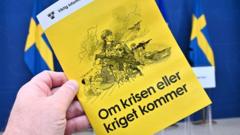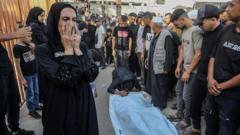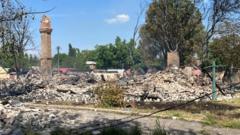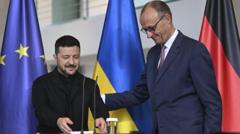Nordic countries are urging citizens to adopt emergency preparedness measures in light of heightened security threats stemming from the war in Ukraine.
**Nordic Nations Enhance Crisis Preparedness Amid Rising Tensions**

**Nordic Nations Enhance Crisis Preparedness Amid Rising Tensions**
As geopolitical tensions escalate, Sweden, Finland, and Norway reinforce guidance for citizens on crisis readiness.
Amid increasing geopolitical tensions in Europe, three Nordic nations are stepping up their crisis preparedness programs to ensure their citizens are equipped to handle potential emergencies. Starting Monday, millions of Swedish households will receive the newly updated pamphlet titled "If Crisis or War Comes." This revision marks the first significant update in six years, informed by the ongoing security concerns following Russia's full-scale invasion of Ukraine. The new booklet is notably expanded, suggesting the government’s acknowledgment of a changing global landscape.
Finland has also joined this initiative by launching an updated online guide for handling crises, focusing on the country's strategic readiness for unexpected incidents. Unlike Sweden, Finland has opted not to distribute physical copies to every household, citing high associated costs; however, citizens can access all updates digitally. In neighboring Norway, citizens recently received a pamphlet advising them to prepare for self-sufficiency for up to a week in scenarios involving extreme weather, war, or other emergencies. Tore Kamfjord from Norway's Directorate for Civil Protection (DSB) reported that 2.2 million paper copies have been distributed to promote individual preparedness amid rising threats.
The Finnish guide emphasizes the government's commitment to self-defense, detailing protocols in the event of a military attack. Finland, which has a historical context of maintaining a robust defense posture due to its proximity to Russia, has always been acutely aware of the potential for conflict. In contrast, Sweden’s civil emergency plan recalls its origins from World War II and the Cold War, previously underestimating the likelihood of a military attack.
Swedish Civil Defence Minister Carl-Oskar Bohlin has expressed concern regarding the country's previous complacency about warfare, advocating for better public awareness of potential threats. The new version of the Swedish pamphlet underscores resilience, stating firmly: "If Sweden is attacked by another country, we will never give up." This heightened sense of urgency to bolster national defense mechanisms has been echoed across both countries, as they reassess their strategies in response to Russia’s aggressive military posture.
Norwegian authorities highlight the importance of readiness, encompassing vital items such as long-life food, medical supplies, and even specifics like iodine tablets for nuclear preparedness. In Sweden, citizens are encouraged to stock essential supplies ranging from fresh vegetables to survival foods aimed at ensuring safety in crises.
The call for enhanced preparedness resonates within the populations, as individuals like 24-year-old Melissa Eve Ajosmaki—originally from Finland but studying in Gothenburg—share that the war in Ukraine amplifies her concerns about familial safety back home. Though many express that they are calm about potential threats, the overall sentiment reflects a growing recognition of the need for individual readiness amid an unpredictable security environment.
In these times of uncertainty, the Nordic nations are committed to informing their citizens, advocating for a proactive approach while reminding them to prepare for self-sufficiency in the face of potential crises.
Finland has also joined this initiative by launching an updated online guide for handling crises, focusing on the country's strategic readiness for unexpected incidents. Unlike Sweden, Finland has opted not to distribute physical copies to every household, citing high associated costs; however, citizens can access all updates digitally. In neighboring Norway, citizens recently received a pamphlet advising them to prepare for self-sufficiency for up to a week in scenarios involving extreme weather, war, or other emergencies. Tore Kamfjord from Norway's Directorate for Civil Protection (DSB) reported that 2.2 million paper copies have been distributed to promote individual preparedness amid rising threats.
The Finnish guide emphasizes the government's commitment to self-defense, detailing protocols in the event of a military attack. Finland, which has a historical context of maintaining a robust defense posture due to its proximity to Russia, has always been acutely aware of the potential for conflict. In contrast, Sweden’s civil emergency plan recalls its origins from World War II and the Cold War, previously underestimating the likelihood of a military attack.
Swedish Civil Defence Minister Carl-Oskar Bohlin has expressed concern regarding the country's previous complacency about warfare, advocating for better public awareness of potential threats. The new version of the Swedish pamphlet underscores resilience, stating firmly: "If Sweden is attacked by another country, we will never give up." This heightened sense of urgency to bolster national defense mechanisms has been echoed across both countries, as they reassess their strategies in response to Russia’s aggressive military posture.
Norwegian authorities highlight the importance of readiness, encompassing vital items such as long-life food, medical supplies, and even specifics like iodine tablets for nuclear preparedness. In Sweden, citizens are encouraged to stock essential supplies ranging from fresh vegetables to survival foods aimed at ensuring safety in crises.
The call for enhanced preparedness resonates within the populations, as individuals like 24-year-old Melissa Eve Ajosmaki—originally from Finland but studying in Gothenburg—share that the war in Ukraine amplifies her concerns about familial safety back home. Though many express that they are calm about potential threats, the overall sentiment reflects a growing recognition of the need for individual readiness amid an unpredictable security environment.
In these times of uncertainty, the Nordic nations are committed to informing their citizens, advocating for a proactive approach while reminding them to prepare for self-sufficiency in the face of potential crises.




















